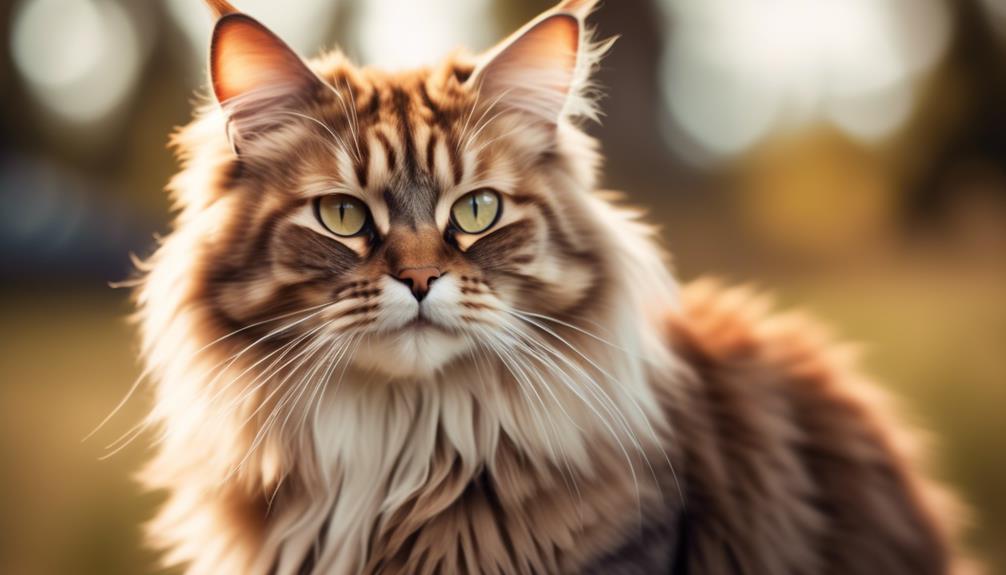
Majestic, magnificent, and mysterious, the Maine Coon cat captures the hearts of feline enthusiasts around the world.
This remarkable breed boasts an array of distinctive characteristics that set it apart from the rest.
From its origin in the state of Maine to its impressive size and friendly temperament, the Maine Coon cat breed has a history and allure that begs to be explored.
But what other secrets lie behind those captivating eyes?
Join us as we unravel the enigmatic world of Maine Coon cats and discover the traits that make them truly extraordinary companions.
Key Takeaways
- Maine Coon cats are one of the largest domestic cat breeds, known for their size and muscular bodies.
- They are friendly and pleasant, making them suitable for families with children.
- Maine Coons have a wide range of captivating coat colors and patterns, with long, thick, and water-repellent fur.
- Regular grooming, proper nutrition, and healthcare contribute to the overall well-being and longevity of Maine Coon cats.
Origin and History
The Maine Coon cat breed originated in the United States, specifically in the state of Maine.
It’s believed these cats descended from domesticated cats brought over by European settlers.
Over time, they adapted to the Maine region’s cold climate and harsh conditions, developing unique characteristics to survive.
While there are several theories about their origins, one popular belief is that they’re a crossbreed between domestic cats and raccoons due to their large size, tufted ears, and bushy tails.
However, this theory has been debunked, as genetic testing has shown no raccoon ancestry.
Regardless of their exact origins, Maine Coons have become a beloved breed worldwide, known for their friendly nature, sociability, and stunning appearance.
See another cat breed profile.
Mekong Bobtail Cat Breed
Size and Weight
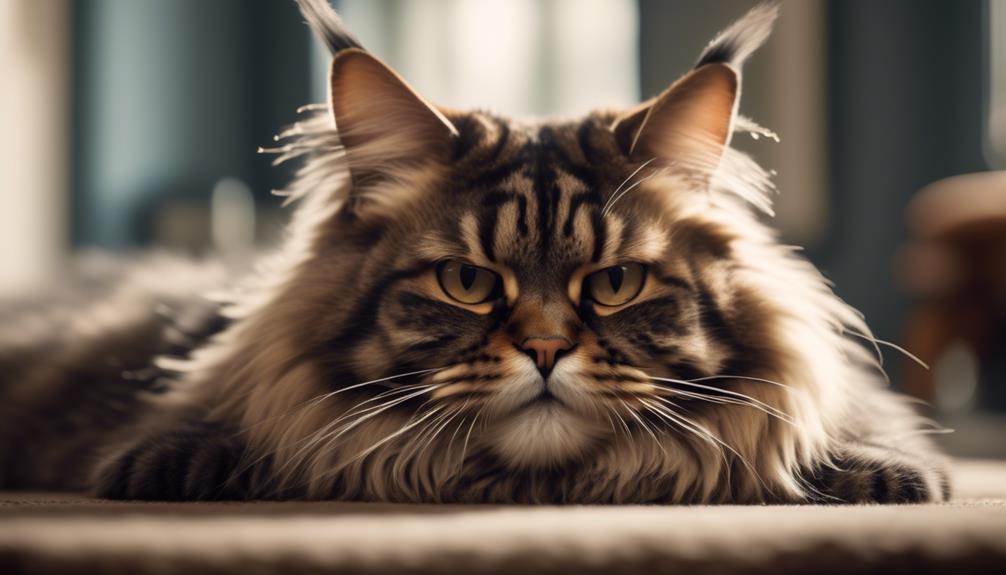
After exploring the origins and history of Maine Coon cats, it’s fascinating to delve into their impressive size and weight.
Maine Coons are known for their substantial build and large size.
Here are some key points about their size and weight:
- Maine Coons are one of the largest domestic cat breeds.
- Males typically weigh between 13 to 18 pounds.
- Females are slightly smaller, weighing around 8 to 12 pounds.
- Their size isn’t solely due to their weight but also their long, muscular bodies.
- Maine Coons have a sturdy bone structure and are well-proportioned overall.
- Despite their size, they’re graceful and agile, showcasing their athleticism.
It’s clear that Maine Coons are truly impressive when it comes to their size and weight, making them a majestic and captivating breed to behold.
Breed Group Classification
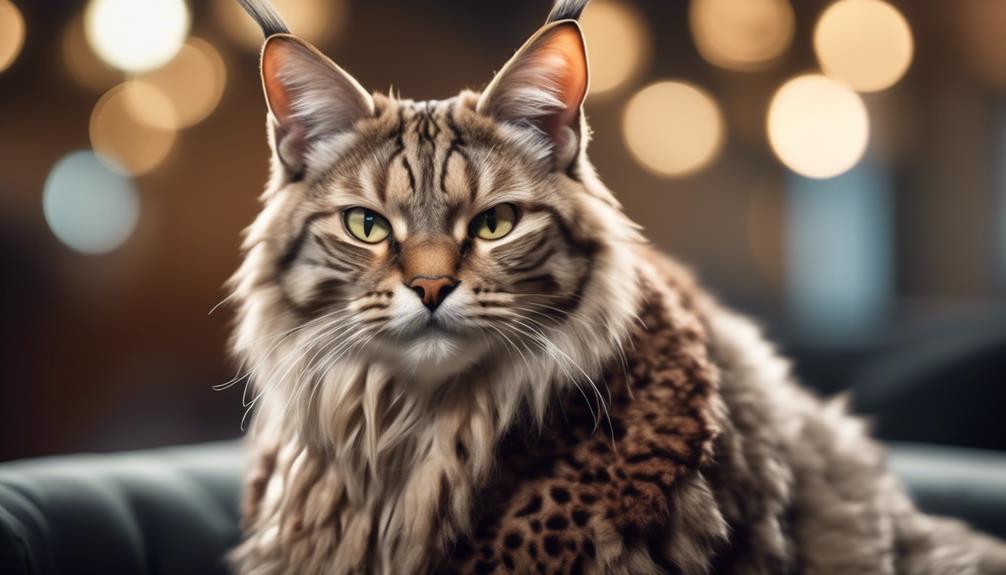
Maine Coon cats are classified within the natural breed group, known for their distinctive characteristics and origins in the United States.
The natural breed group comprises cat breeds that have evolved naturally without human intervention or selective breeding.
These cats have adapted to their environments and developed unique traits suited for survival.
Maine Coon cats, with their large size, tufted ears, and bushy tails, fit well within this group.
They have a strong, muscular build and a thick, water-repellent coat that helps them withstand harsh weather conditions.
Maine Coon cats are known for their gentle and friendly temperament, making them popular and beloved pets in households around the world.
Lifespan and Aging
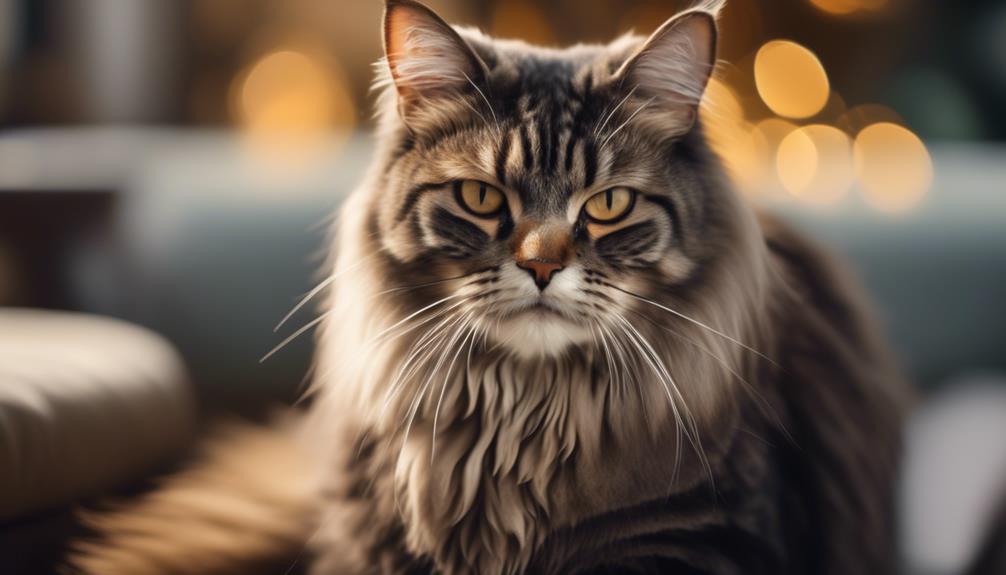
As Maine Coon cats age, their lifespan typically ranges from 12 to 15 years.
However, it’s important to note that individual cats may live longer or shorter lives depending on various factors such as genetics, diet, exercise, and overall health care.
To ensure a long and healthy life for your Maine Coon, it’s crucial to provide them with proper nutrition, regular veterinary check-ups, and dental care.
Additionally, maintaining their weight within a healthy range and addressing potential genetic health issues, such as hip dysplasia or hypertrophic cardiomyopathy, can greatly contribute to their overall well-being.
Coat Colors and Patterns
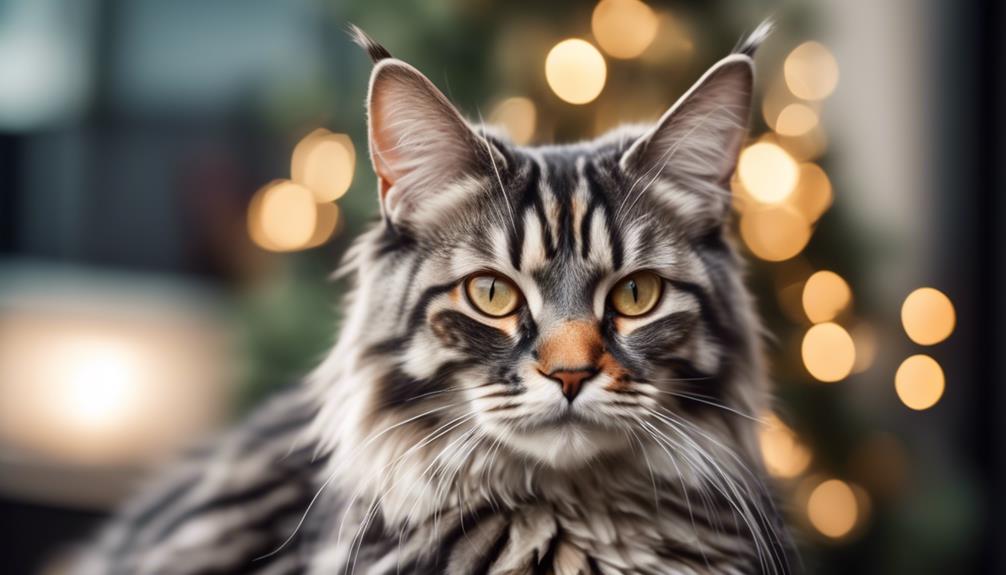
The Maine Coon cats exhibit a wide range of captivating coat colors and patterns.
Their coats are known for being long, thick, and water-repellent, which helps them stay warm and dry in cold weather.
One of the most common coat colors is brown tabby, which combines brown, black, and tan stripes.
Other popular colors include black, white, red, and cream.
In addition to solid colors, Maine Coons can also have various patterns, such as tortoiseshell, calico, and smoke. Some cats may even have unique patterns like tabby and white or colorpoint.
These beautiful coat colors and patterns contribute to the Maine Coon’s distinctive and majestic appearance.
Temperament and Personality
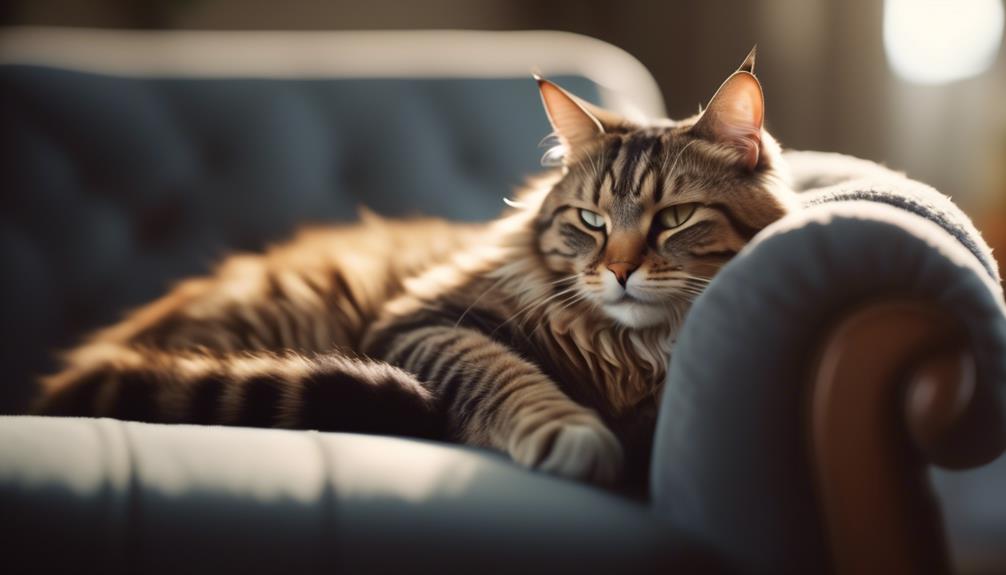
With their gentle and friendly temperament, Maine Coon cats are known for being nice and easy to get along with.
They are known for being great companions and getting along well with children and other pets.
Here are some key characteristics of their personality:
- Playful nature: Maine Coons are highly active and love to play, making them great entertainment for the whole family.
- Affectionate disposition: These cats enjoy being around their human companions and are known for their loving and cuddly nature.
- Intelligent and curious: Maine Coons are smart cats that love to explore their surroundings and engage in interactive play.
- Gentle and patient: They are typically patient and tolerant, which makes them a good choice for families with children.
Exercise and Activity Needs
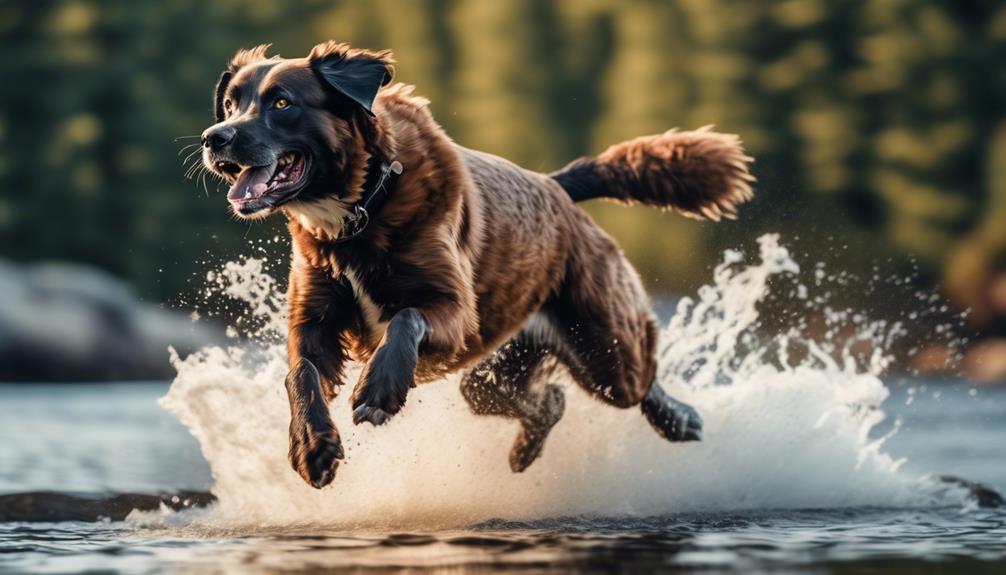
Coming to their exercise and activity needs, Maine Coon cats thrive on engaging in physical activities.
These cats are known for their playful and active nature.
They enjoy interactive games, such as chasing toys or playing hide-and-seek.
Maine Coons also love climbing and exploring their surroundings, so providing them with tall scratching posts or cat trees can help fulfill their instincts.
Outdoor playtime benefits these cats, allowing them to run and explore in a safe environment.
It’s important to ensure they can access secure outdoor space or supervised outings on a harness and leash.
Regular exercise not only keeps Maine Coons physically fit but also helps prevent obesity and boredom-related behavioral issues.
Training and Trainability
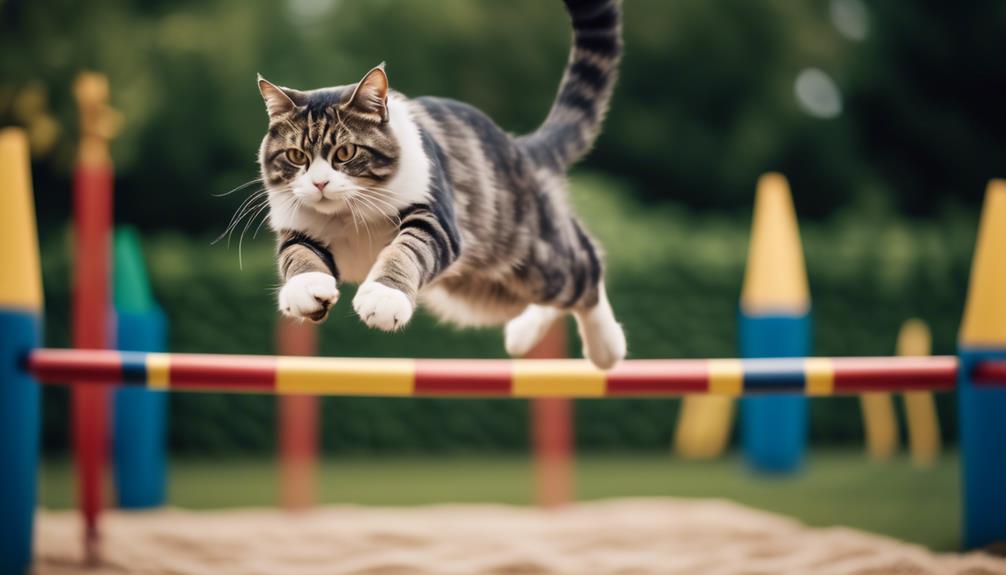
Training and interacting with Maine Coon cats can be a rewarding experience due to their high intelligence and willingness to learn.
These cats are easily trainable and quickly pick up on commands and tricks.
Here are some key points to consider when training a Maine Coon:
- Maine Coons are highly intelligent and enjoy mental stimulation, making them receptive to training.
- Positive reinforcement techniques, such as treats and praise, work best when teaching them new skills.
- Maine Coons are eager to please and enjoy the bond that’s formed during training sessions.
- They can be trained to walk on a leash and perform tricks like sitting, shaking paws, and playing fetch.
- Consistency and patience are crucial when training a Maine Coon as they can be independent at times.
Grooming Requirements
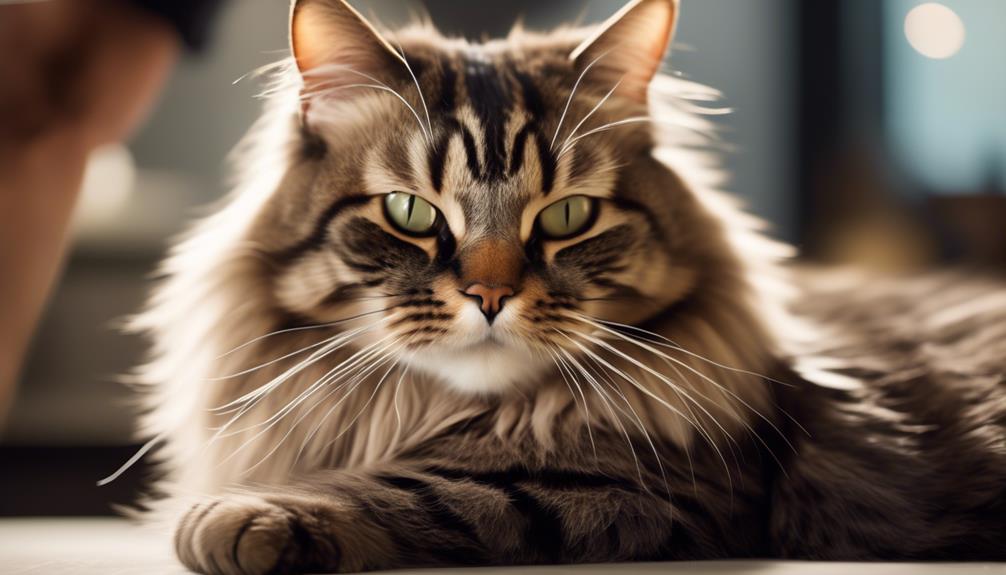
Regular grooming is essential for maintaining the long, thick, and water-repellent coat of Maine Coon cats.
Due to their dense fur, Maine Coons require regular brushing to prevent matting and to keep their coat in optimal condition.
Brushing should be done at least once or twice a week using a stainless steel comb or a slicker brush.
This helps to remove loose hair, prevent tangles, and reduce the risk of hairballs.
Additionally, regular grooming allows for early detection of any skin issues or parasites.
Maine Coons are generally good at grooming themselves, but extra attention should be given to their ears, eyes, and nails.
Ears should be checked and cleaned regularly to prevent wax build-up and infections.
Eyes should be checked for any discharge or redness. Nails should be trimmed regularly to prevent overgrowth and discomfort.
Genetic Health Conditions
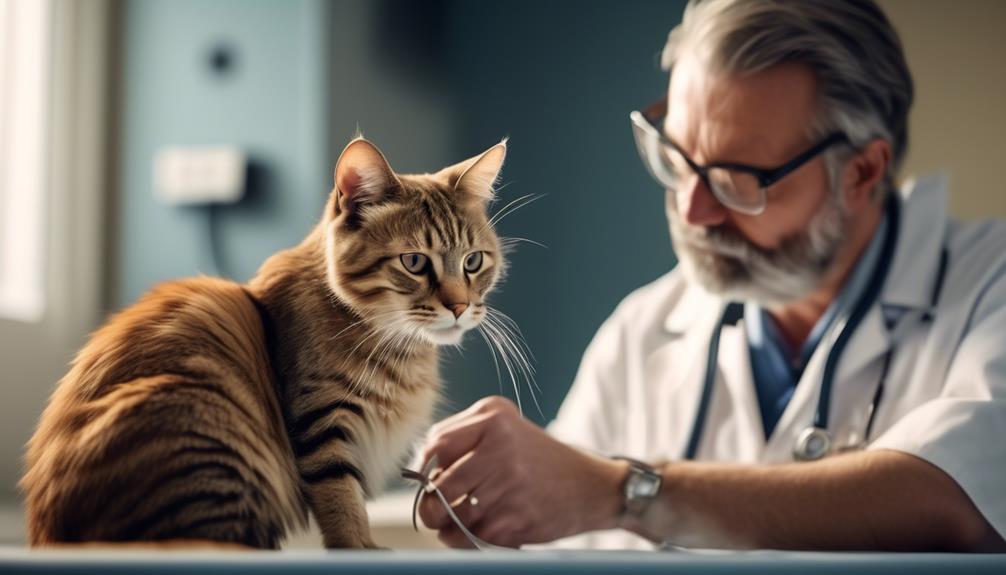
Moving on to the topic of genetic health conditions, it’s important to be aware of the potential issues that Maine Coon cats may be prone to.
Like any other breed, these cats can have certain genetic health conditions that owners should be mindful of.
Here are two sub-lists of common genetic health issues that Maine Coon cats may experience:
2. Orthopedic Conditions:
- Hip dysplasia: a condition where the hip joint is malformed, leading to pain and mobility issues.
- Spinal muscular atrophy: a genetic disorder that affects the muscles, causing weakness and difficulty in movement.
2. Cardiovascular and Renal Conditions:
- Hypertrophic cardiomyopathy: a heart condition where the heart muscles thicken, potentially leading to heart failure.
- Polycystic kidney disease: a condition where cysts develop in the kidneys, affecting their function.
Being aware of these genetic health conditions can help owners take proactive measures and provide the best possible care for their Maine Coon cats.
Adoption and Breeding Considerations
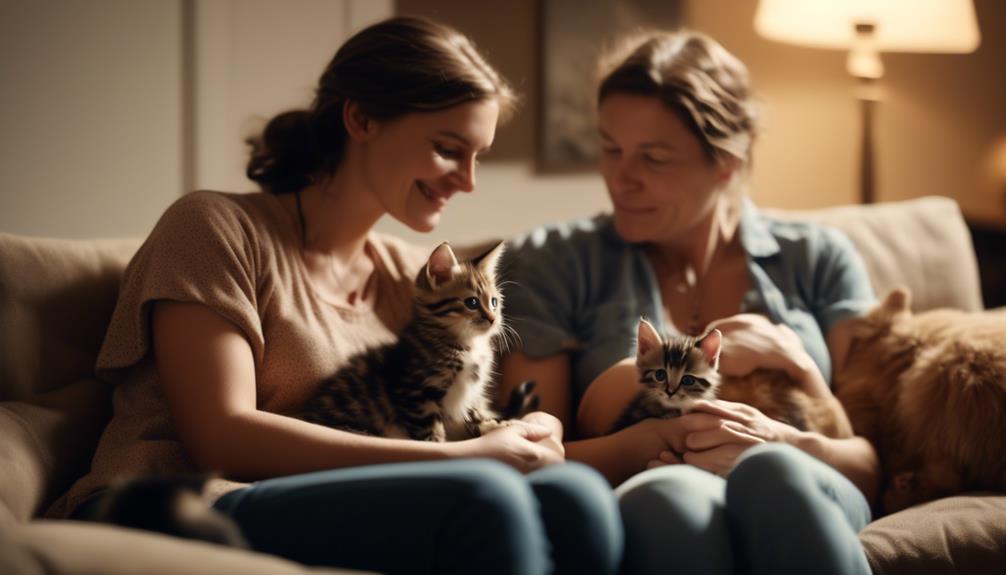
When considering adoption or breeding of Maine Coon cats, it is important to prioritize ethical practices and the health and temperament of the cats.
Maine Coons can be adopted from rescue organizations or shelters, which is a great way to provide a loving home to cats in need.
When considering breeding, choosing a reputable breeder and conducting thorough research is essential.
The table below highlights some key factors to consider when adopting or breeding Maine Coon cats:
| Adoption Considerations | Breeding Considerations |
|---|---|
| Prioritize rescue organizations or shelters | Choose a reputable breeder |
| Conduct thorough research | Ensure ethical breeding practices |
| Consider the health and temperament of the cat | Prioritize the health and temperament of cats |
Frequently Asked Questions
Are Maine Coon Cats Hypoallergenic?
Maine Coon cats are not hypoallergenic.
While they have long, thick fur that may reduce dander in the environment, they still produce allergenic proteins in their saliva and skin secretions that can trigger allergies in sensitive individuals.
How Do Maine Coon Cats Get Along With Other Pets in the Household?
Maine Coon cats generally get along well with other pets in the household.
They have a gentle and friendly temperament, making forming positive relationships with other animals easier.
Do Maine Coon Cats Require a Special Diet or Nutrition?
Maine Coon cats do not require a special diet, but they benefit from a balanced and nutritious one.
It is important to provide them with high-quality cat food that meets their needs for a healthy weight and overall well-being.
How Do Maine Coon Cats Handle Being Left Alone for Long Periods?
Maine Coon cats, known for their friendly nature, may not handle being left alone for long periods well.
They thrive on human interaction and companionship, so it’s important to provide them with mental stimulation and attention when their owners are away.
Are Maine Coon Cats Prone to Excessive Shedding?
Maine Coon cats are not prone to excessive shedding.
While they have long, thick coats, their fur is water-repellent and does not shed excessively.
Regular grooming can help prevent matting and keep their fur healthy.
Conclusion
In conclusion, the Maine Coon cat breed is a fascinating and beloved feline with unique characteristics and a rich history.
Known for their large size, gentle temperament, and sociability, Maine Coons make ideal companions for households.
However, they require regular grooming and are prone to certain genetic health conditions.
By prioritizing proper care, nutrition, and adoption from reputable sources, Maine Coon owners can ensure the well-being and happiness of these wonderful cats.




